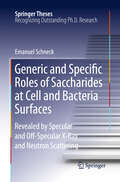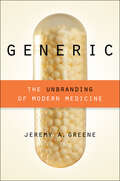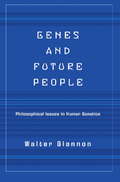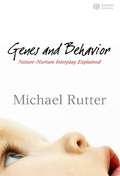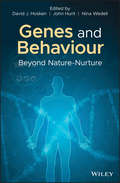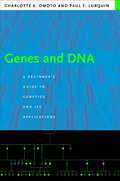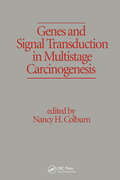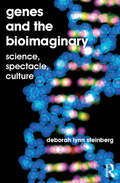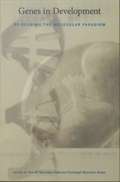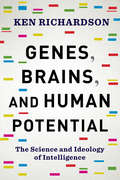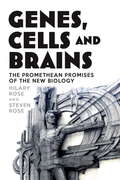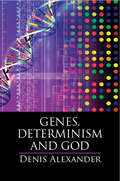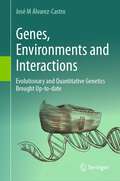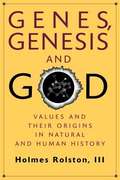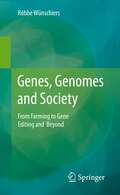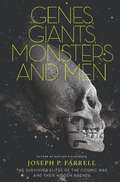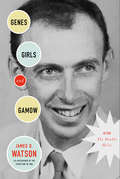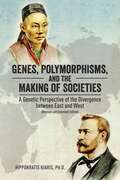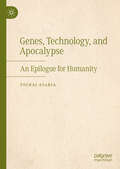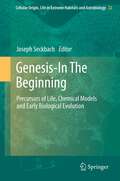- Table View
- List View
Generic and Specific Roles of Saccharides at Cell and Bacteria Surfaces
by Emanuel SchneckSystematic investigations of the structure, mechanics, and dynamics of biological surfaces help us understand more about biological processes taking place at cell and bacteria surfaces. Presented here is a study of the role membrane-bound saccharides play in the modulation of interactions between cells/bacteria and their environments. In this thesis, membrane structures were probed perpendicular and parallel to the surface, and sophisticated planar models of biomembranes composed of glycolipids of various structural complexities were designed. Furthermore, specular and off-specular X-ray and neutron scattering experiments were carried out. This research has led to the development of several new methods for extracting information on the structure and mechanics of saccharide-rendered biomembranes from the measured scattering signals. In fact, more is now known about the influence of the saccharide structure. These results demonstrate that the study of planar model systems with X-ray and neutron scattering techniques can provide comprehensive insight into the structure and mechanics of complex biological surfaces.
Generic: The Unbranding of Modern Medicine
by Jeremy A. GreeneThe turbulent history of generic pharmaceuticals raises powerful questions about similarity and difference in modern medicine.Generic drugs are now familiar objects in clinics, drugstores, and households around the world. We like to think of these tablets, capsules, patches, and ointments as interchangeable with their brand-name counterparts: why pay more for the same? And yet they are not quite the same. They differ in price, in place of origin, in color, shape, and size, in the dyes, binders, fillers, and coatings used, and in a host of other ways. Claims of generic equivalence, as physician-historian Jeremy Greene reveals in this gripping narrative, are never based on being identical to the original drug in all respects, but in being the same in all ways that matter.How do we know what parts of a pill really matter? Decisions about which differences are significant and which are trivial in the world of therapeutics are not resolved by simple chemical or biological assays alone. As Greene reveals in this fascinating account, questions of therapeutic similarity and difference are also always questions of pharmacology and physiology, of economics and politics, of morality and belief.Generic is the first book to chronicle the social, political, and cultural history of generic drugs in America. It narrates the evolution of the generic drug industry from a set of mid-twentieth-century "schlock houses" and "counterfeiters" into an agile and surprisingly powerful set of multinational corporations in the early twenty-first century.The substitution of bioequivalent generic drugs for more expensive brand-name products is a rare success story in a field of failed attempts to deliver equivalent value in health care for a lower price. Greene’s history sheds light on the controversies shadowing the success of generics: problems with the generalizability of medical knowledge, the fragile role of science in public policy, and the increasing role of industry, marketing, and consumer logics in late-twentieth-century and early twenty-first century health care.
Genes And Future People
by Walter GlannonAdvances in genetic technology in general and medical genetics in particular will enable us to intervene in the process of human biological development which extends from zygotes and embryos to people. This will allow us to control to a great extent the identities and the length and quality of the lives of people who already exist, as well as those we bring into existence in the near and distant future. Genes and Future People explores two general philosophical questions, one metaphysical, the other moral: (1) How do genes, and different forms of genetic intervention (gene therapy, genetic enhancement, presymptomatic genetic testing of adults, genetic testing of preimplantation embryos), affect the identities of the people who already exist and those we bring into existence? and (2) How do these interventions benefit or harm the people we cause to exist in the near future and those who will exist in the distant future by satisfying or defeating their interest in having reasonably long and disease-free lives?Genes and Future People begins by explaining the connection between genes and disease, placing genetic within a framework of evolutionary biology. It then discusses such topics as how genes and genetic intervention influence personal identity, what genetic testing of individuals and the knowledge resulting from it entails about responsibility to others who may be at risk, as well as how gene therapy and genetic enhancement can affect the identities of people and benefit or harm them. Furthermore, it discusses various moral aspects of cloning human beings and body parts. Finally, it explores the metaphysical and moral implications of genetic manipulation of the mechanisms of aging to extend the human life span. The aim Genes and Future People is to move philosophers, bioethicists, and readers in general to reflect on the extent to which genes determine whether we are healthy or diseased, our identities as persons, the quality of our lives, and our moral obligations to future generations of people.
Genes and Behavior: Nature-Nurture Interplay Explained
by Michael RutterIn this major new book, eminent scientist Professor Sir Michael Rutter gets behind the hype of the behavioral genetics debate to provide a balanced and authoritative overview of the genetic revolution and its implications for understanding human behavior. Written by one of the world's leading figures in child psychology and psychiatry, Professor Sir Michael Rutter Provides non-technical explanation of genetics to diffuse the sensational debates surrounding the topic Sets out in layman's terms what genes do, how much is nature and how much is nurture Argues that nature and nurture are not truly separate and gives examples of how the two interact Looks at the implications of genetic findings for policy and practice The book will inform public debate about the implications of the Human Genome Project and, more broadly, the field of genetic science.
Genes and Behaviour: Beyond Nature-Nurture
by John Hunt David J. Hosken Nina WedellProvides a broad snapshot of recent findings showing how the environment and genes influence behavior The great debate of nature versus nurture rages on — but our understanding of the genetic basis of many behaviors has expanded over the last decade, and there is now very good evidence showing that seemingly complex behaviours can have relatively simple genetic underpinnings, but also that most behaviours have very complicated genetic and environmental architecture. Studies have also clearly shown that behaviors, and other traits, are influenced not just by genes and the environment, but also by the statistical interaction between the two. This book aims to end the nature versus nurture argument by showing that behaviors are nature and nurture and the interaction between the two, and by illustrating how single genes can explain some of the variation in behaviors even when they are seemingly complex. Genes and Behaviour: Beyond Nature-Nurture puts to rest the nature versus nurture dichotomy, providing an up-to-date synopsis of where we are, how far we've come and where we are headed. It considers the effects of a dual-inheritance of genes and culture, and genes and social environment, and highlights how indirect genetic effects can affect the evolution of behavior. It also examines the effect of non-self genes on the behavior of hosts, shines a light on the nature and nurturing of animal minds and invites us to embrace all the complexity nature and nurture generates, and more. Explores exciting new findings about behavior and where we go from here Features contributions by top scholars of the subject Seeks to end the nature versus nurture debate forever Genes and Behaviour: Beyond Nature-Nurture is a unique, and eye-opening read that will appeal to Ph.D. Students, post-doctoral fellows, and researchers in evolution and behavior. Additionally, the book will also be of interest to geneticists, sociologists and philosophers.
Genes and Cardiovascular Function
by Bohuslav Ostadal Makoto Nagano Naranjan S. DhallaRapid advances in molecular medicine have led to pronounced new developments in experimental and clinical cardiology. In the embrace of modern molecular biology and bridging the gap between the clinical and the genomic, cardiovascular medicine has seen major strides in the understanding of the molecular mechanisms that drive disease progression. The ability to rapidly identify candidate human genes for cardiovascular diseases lends itself to the development of diverse strategies for disease treatment and management. The wide variety of gene expressions proffers excellent targets for novel therapeutics. Gene therapy is steadily increasing in viability and represents a fascinating arena of research and clinical focus. This book is based on two international Mendel symposia on "Genes and the Heart," joint meetings of the Japanese and European sections of the International Academy of Cardiovascular Sciences. Highlighting selected symposia contributions, this book explores the role of molecular biology and genetics in the basic knowledge, genesis, and clinical interventions of cardiovascular diseases.
Genes and DNA: A Beginner's Guide to Genetics and Its Applications
by Paul F. Lurquin Omoto Charlotte K.Covering newsworthy aspects of contemporary biology-gene therapy, the Human Genome Project, DNA testing, and genetic engineering-as well as fundamental concepts, this book, written specifically for nonbiologists, discusses classical and molecular genetics, quantitative and population genetics-including cloning and genetic diseases-and the many applications of genetics to the world around us, from genetically modified foods to genetic testing. With minimal technical terminology and jargon, Genes and DNA facilitates conceptual understanding. Eschewing the organization of traditional genetics texts, the authors have provided an organic progression of information: topics are introduced as needed, within a broader framework that makes them meaningful for nonbiologists. The book encourages the reader to think independently, always stressing scientific background and current facts.
Genes and DNA: A Beginner's Guide to Genetics and Its Applications
by Charlotte OmotoCovering newsworthy aspects of contemporary biology—gene therapy, the Human Genome Project, DNA testing, and genetic engineering—as well as fundamental concepts, this book, written specifically for nonbiologists, discusses classical and molecular genetics, quantitative and population genetics—including cloning and genetic diseases—and the many applications of genetics to the world around us, from genetically modified foods to genetic testing. With minimal technical terminology and jargon, Genes and DNA facilitates conceptual understanding. Eschewing the organization of traditional genetics texts, the authors have provided an organic progression of information: topics are introduced as needed, within a broader framework that makes them meaningful for nonbiologists. The book encourages the reader to think independently, always stressing scientific background and current facts.
Genes and Signal Transduction in Multistage Carcinogenesis
by Nancy H. ColburnThis book describes the identification and characterization of genetic loci that determine susceptibility to liver, mammary, or skin carcinogenesis in rodents. It focuses on protein kinases and phospholipases, and stress-related signal transduction.
Genes and the Bioimaginary: Science, Spectacle, Culture
by Deborah Lynn SteinbergGenes and the Bioimaginary examines the dramatic rise and contemporary cultural apotheosis of 'the gene'. The book traces not only the genetification of modern life but is also a journey through the complex relationship between science and culture. At the heart of this book are three interlinked questions. The first concerns the paradigmatic transformations of the 'genetics revolution': how can we understand the impact of genes on social arenas as diverse as law and agriculture, politics and medicine, genealogy and jurisprudence? Second, how has the language of genes come to pervade public discourse - as much a trope of personal narrative as of the popular imaginary? And third, how can we gain critical purchase not only on the conditions and consequences of a particular science, but on its projective seductions, the terms of its persuasion, and the dilemmas and anxieties provoked in its wake? Through a series of illuminating case studies ranging from 'gay genes' to 'Jew genes', to genes for crime; from CSI to the Innocence Project, from genetics (post)racial imaginary to its phantasies of redemption, the book examines the emergence of the gene as a pre-eminent locus of both scientific and social explanation, and as a powerful object of spectacle, projective phantasy and attachment. Genes and the Bioimaginary makes a distinctive contribution to our understanding of how knowledge comes to be not only powerful, but plausible.
Genes and the Environment
by Roy H. BurdonGenes and the Environment is concerned with genes and how their structures and activities can be influenced by current relevant environmental adversitises. The book aims to provide a brief, integrated coverage at a biochemical and molecular biological level of the various effects that environmental factors can have on our genes, and those of other
Genes in Development: Re-reading the Molecular Paradigm
by Eva M. Neumann-Held Christoph Rehmann-SutterIn light of scientific advances such as genomics, predictive diagnostics, genetically engineered agriculture, nuclear transfer cloning, and the manipulation of stem cells, the idea that genes carry predetermined molecular programs or blueprints is pervasive. Yet new scientific discoveries--such as rna transcripts of single genes that can lead to the production of different compounds from the same pieces of dna--challenge the concept of the gene alone as the dominant factor in biological development. Increasingly aware of the tension between certain empirical results and interpretations of those results based on the orthodox view of genetic determinism, a growing number of scientists urge a rethinking of what a gene is and how it works. In this collection, a group of internationally renowned scientists present some prominent alternative approaches to understanding the role of dna in the construction and function of biological organisms. Contributors discuss alternatives to the programmatic view of dna, including the developmental systems approach, methodical culturalism, the molecular process concept of the gene, the hermeneutic theory of description, and process structuralist biology. None of the approaches cast doubt on the notion that dna is tremendously important to biological life on earth; rather, contributors examine different ideas of how dna should be represented, evaluated, and explained. Just as ideas about genetic codes have reached far beyond the realm of science, the reconceptualizations of genetic theory in this volume have broad implications for ethics, philosophy, and the social sciences. Contributors. Thomas Brglin, Brian C. Goodwin, James Griesemer, Paul Griffiths, Jesper Hoffmeyer, Evelyn Fox Keller, Gerd B. Mller, Eva M. Neumann-Held, Stuart A. Newman, Susan Oyama, Christoph Rehmann-Sutter, Sahotra Sarkar, Jackie Leach Scully, Gerry Webster, Ulrich Wolf
Genes, Brains, and Human Potential: The Science and Ideology of Intelligence
by Ken RichardsonFor countless generations people have been told that their potential as humans is limited and fundamentally unequal. The social order, they have been assured, is arranged by powers beyond their control. More recently the appeal has been to biology, specifically the genes, brain sciences, the concept of intelligence, and powerful new technologies. Reinforced through the authority of science and a growing belief in bio-determinism, the ordering of the many for the benefit of a few has become more entrenched. Yet scientists are now waking up to the influence of ideology on research and its interpretation. In Genes, Brains, and Human Potential, Ken Richardson illustrates how the ideology of human intelligence has infiltrated genetics, brain sciences, and psychology, flourishing in the vagueness of basic concepts, a shallow nature-versus-nurture debate, and the overhyped claims of reductionists. He shows how ideology, more than pure science, has come to dominate our institutions, especially education, encouraging fatalism about the development of human intelligence among individuals and societies. Genes, Brains, and Human Potential goes much further: building on work being done in molecular biology, epigenetics, dynamical systems, evolution theory, and complexity theory, it maps a fresh understanding of intelligence and the development of human potential. Concluding with an upbeat message for human possibilities, this synthesis of diverse perspectives will engender new conversations among students, researchers, and other interested readers.
Genes, Cells and Brains
by Hilary Rose Steven RoseOur fates lie in our genes and not in the stars, said James Watson, co-discoverer of the structure of DNA. But Watson could not have predicted the scale of the industry now dedicated to this new frontier. Since the launch of the multibillion-dollar Human Genome Project, the biosciences have promised miracle cures and radical new ways of understanding who we are. But where is the new world we were promised?In Genes, Cells, and Brains, feminist sociologist Hilary Rose and neuroscientist Steven Rose take on the bioscience industry and its claims. Examining the rivalries between public and private sequencers,the establishment of biobanks, and the rise of stem cell research, they ask why the promised cornucopia of health benefits has failed to emerge. Has bioethics simply become an enterprise? As bodies become increasingly commodified, perhaps the failure to deliver on these promises lies in genomics itself.
Genes, Determinism and God
by Denis AlexanderOver the past centuries the pendulum has constantly swung between an emphasis on the role of either nature or nurture in shaping human destiny, a pendulum often energised by ideological considerations. In recent decades the flourishing of developmental biology, genomics, epigenetics and our increased understanding of neuronal plasticity have all helped to subvert such dichotomous notions. Nevertheless, the media still report the discovery of a gene 'for' this or that behaviour, and the field of behavioural genetics continues to extend its reach into the social sciences, reporting the heritability of such human traits as religiosity and political affiliation. There are many continuing challenges to notions of human freedom and moral responsibility, with consequent implications for social flourishing, the legal system and religious beliefs. In this book, Denis Alexander critically examines these challenges, concluding that genuine free will, often influenced by genetic variation, emerges from an integrated view of human personhood derived from contemporary biology.
Genes, Environments and Interactions: Evolutionary and Quantitative Genetics Brought Up-to-date
by José M Álvarez-CastroGenetic effects are the core concepts from which quantitative genetics and the evolutionary synthesis emerged. The groundbreaking theory of genetic effects was first proposed over a century ago. This book revises that theory, both conceptually and mathematically, and brings it up-to-date. The theory here compiled is supplemented with non-previously-published developments covering the broadest spectrum of simultaneously multiallelic and multilocus architectures with autosomal and sex-linked lociArbitrary interactions (dominance, gene-gene, gene-environment, gene-sex, and parent-of-origin interactions) are accounted forBoth effects of allele substitutions from the reference of individual genotypes and in the context of populations are worked outPopulations are considered regardless of any departures from equilibrium frequencies (including both departures from Hardy-Weinberg, departures from linkage equilibrium, and non-random associations between/among genes and environments)All developments are derived under the same mathematical framework, so that transformations of genetic effects between different contexts are easily allowed In brief, this book enables novel applications to current empirical paradigms (like gene-mapping and genomic prediction) while adhering to the classical conceptualization of genetic effects and variance decomposition that let quantitative genetics and the evolutionary synthesis flourish. All relevant concepts are carefully clarified and discussed from a historical perspective. The theoretical developments presented in the book are illustrated by built-in cases and applications with real data. Reassuringly, the adequacy of the theory here presented is corroborated based on the fundamentals of model development.
Genes, Genesis, and God: Values and Their Origins in Natural and Human History
by Holmes Rolston IIIHolmes Rolston challenges the sociobiological orthodoxy that would naturalize science, ethics, and religion. The book argues that genetic processes are not blind, selfish, and contingent, and that nature is therefore not value-free. The author examines the emergence of complex biodiversity through evolutionary history. Especially remarkable in this narrative is the genesis of human beings with their capacities for science, ethics, and religion. A major conceptual task of the book is to relate cultural genesis to natural genesis. There is also a general account of how values are created and transmitted in both natural and human cultural history. The book is written by one of the most well-respected figures in the philosophy of biology and religion.
Genes, Genomes and Society: From Farming to Gene Editing and Beyond
by Röbbe WünschiersWith CRISPR/Cas gene editing tools in hand, we are currently experiencing a new dimension in genetic engineering. But where should the journey lead? Should we treat diseases or better repair them genetically? Will the new genetic engineering, combined with modern reproductive biology, lead to designer babies? And: May we allow a liberalization of these techniques as citizen science? New methods can precisely alter the genetic material - and they leave no traces. This gene and genome surgery thrives on increasing knowledge about the mode of action of genes, those trait-giving regions in the genome. This knowledge is being applied in practice, particularly in the breeding of more resistant and higher-yielding crops. And what about us? The author shows that gene variants have long been associated not only with diseases, but also with nutritional preferences or intelligence. Therapeutic and optimization options are close at hand. What effect does the environment have on the expression of genetic material? Genes can be shaped during a person's lifetime by the environment, nutrition or experiences and thus passed on to their offspring in a modified form. So, does society have a new form of long-term responsibility for (epi)genetic integrity? In this vividly and comprehensibly written book, the author explains the state of genetic engineering without assuming too much prior knowledge and invites an open dialogue on this ambivalent topic. Get your own idea of the fascinating yet intimidating possibilities of genetic engineering. Where do you stand on the issue? With the help of this book, you have the chance to form a differentiated opinion. This book is a translation of the original German 1st edition Generation Gen-Schere by Röbbe Wünschiers, published by Springer Fachmedien Wiesbaden GmbH, part of Springer Nature in 2019. The translation was done with the help of artificial intelligence (machine translation by the service DeepL.com). The text was subsequently revised by the author. Springer Nature works continuously to further the development of tools for the production of books and on the related technologies to support the authors.
Genes, Giants, Monsters, and Men
by Joseph P. FarrellConsider the possibility that the history of the human race is not as simple as what has been taught in classroom textbooks. Consider the possibility that the evolutionary scientific explanation for mankind has ignored critical facts that are buried deep within the fossils and mankind's DNA. Consider the possibility that the religious stories that have often been the core basis for mankind's understanding of where it belongs in the history of creation may actually reveal a planet occupied with tyrannical giants and an elite highly intelligent race bent on genetic mutation.As horrifying as such possibilities are, Genes, Giants, Monsters, and Men sets forth a plausible theory revealing a hidden history of mankind and a possible reason that it has remained veiled for hundreds of thousands of years. With his well-documented style and breathtaking conclusions, Dr. Joseph P. Farrell pulls back the veil and takes the reader on an odyssey behind the mysterious history and myths of the human race.Joseph P. Farrell is a recognized scholar whose credentials include a PhD in philosophy from the University of Oxford. His literary contribution is a veritable resumé unto itself covering such fields as Nazi Germany, sacred literature, physics, finances, the Giza pyramids, and music theory. A renowned researcher with an eye to assimilate a tremendous amount of background material, Farrell is able to condense the best scholastic research in publication and draw insightful new conclusions on complex and controversial subjects.
Genes, Girls, and Gamow
by James D. WatsonIn the years following his and Francis Crick's towering discovery of DNA, James Watson was obsessed with finding two things: RNA and a wife. Genes, Girls, and Gamow is the marvelous chronicle of those pursuits. Watson effortlessly glides between his heartbreaking and sometimes hilarious debacles in the field of love and his heady inquiries in the field of science. He also reflects with touching candor on some of science's other titans, from fellow Nobelists Linus Pauling and the incorrigible Richard Feynman to Russian physicist George Gamow, who loved whiskey, limericks, and card tricks as much as he did molecules and genes. What emerges is a refreshingly human portrait of a group of geniuses and a candid, often surprising account of how science is done.From the Trade Paperback edition.
Genes, Polymorphisms, and the Making of Societies: A Genetic Perspective of the Divergence between East and West (Revised and Extended Edition)
by Hippokratis KiarisOur genes determine to a large extent who we are and why we are different from others. In this book, Hippokratis Kiaris explores how various genetic polymorphisms in different ethnic populations may affect the development of distinct cultures and eventual
Genes, Technology, and Apocalypse: An Epilogue for Humanity
by Yochai AtariaThis book offers a critique of a certain contemporary discourse in popular science that consists of (1) identifying the origins and therefore essential nature of Homo Sapiens; and (2) identifying the nature of technology. The author’s critique is that this double gesture generates a deterministic worldview – man is evil and technology has its own necessity – that operates to exonerate humanity from responsibility to the horrors of the 20th century, epitomized in Auschwitz and Hiroshima, for example. The author situates this operation within what he identifies as an “apocalyptical-eschatological state of mind”. Yochai Ataria explains that the dynamics of technology and the quest for the first human are the two central vectors shaping both scientific and popular discourse today, highlighting the importance of understanding the deep connection between the two.
Genes: Yeast Gene Analysis (Methods In Microbiology Ser. #Vol. 26)
by Gordon Graham'It's all in the genes'. Is this true, and if so, what is all in the genes? Genes: A Philosophical Inquiry is a crystal clear and highly informative guide to a debate none of us can afford to ignore.Beginning with a much-needed overview of the relationship between science and technology, Gordon Graham lucidly explains and assesses the most important and controversial aspects of the genes debate: Darwinian theory and its critics, the idea of the 'selfish' gene, evolutionary psychology, memes, genetic screening and modification, including the risks of cloning and 'designer' babies.He considers areas often left out of the genes debate, such as the environmental risks of genetic engineering and how we should think about genes in the wider context of debates on science, knowledge and religion. Gordon Graham asks whether genetic engineering might be introducing God back into the debate and whether the risks of a brave new genetic world outweigh the potential benefits.Essential reading for anyone interested in science, technology, and philosophy, Genes: A Philosophical Inquiry is ideal for those wanting to find out more about the ethical implications of genetics and the future of biotechnology.
Genesis - In The Beginning
by Joseph SeckbachGenesis - In The Beginning deals with the origin and diversity of Life and early biological evolution and discusses the question of where (hot or cold sources) and when the beginning of Life took place. Among the sections are chapters dealing with prebiotic chemical processes and considering self-replication of polymers in mineral habitats. One chapter is dedicated to the photobiological regime on early Earth and the emergence of Life. This volume covers the role of symmetry, information and order (homochrial biomolecules) in the beginning of Life. The models of protocells and the genetic code with gene transfer are important topics in this volume. Three chapters discuss the Panspermia hypothesis (to answer "Are we from outer Space?"). Other chapters cover the Astrobiological aspects of Life in the Universe in extraterrestrial Planets of the Solar System and deal with cometary hydrosphere (and its connection to Earth). We conclude with the history and frontiers of Astrobiogy.
